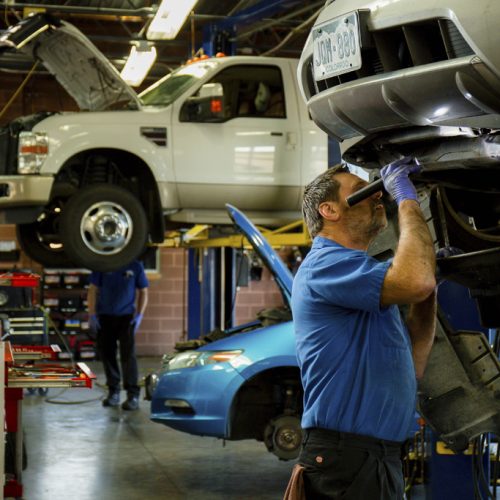For all of you diesel owners out there, here’s to you! You have one workhorse of a truck that is there for all your work needs and recreational activities. Keep your truck in tip-top shape and it will be there for you when you need it! Neglect it, and it will let you down when you need it the most! Here are our suggestions for how to maintain your diesel truck.
Maintenance needs will vary depending on what you use your truck for – towing, hauling, and/or mountain driving all place extra stress on the engine and components. Keeping up with manufacturer’s recommended maintenance schedule will go a long way toward getting the most out of your truck. Remember that the maintenance schedule is generally written for driving under “normal or ideal” conditions.
The maintenance schedule for “Severe” conditions includes uses like towing and hauling loads, frequent short trips (under 4 miles), stop-and-go city driving, driving on gravel roads, mountain driving, and 4WD and off- roading…all reasons that you probably bought your truck in the first place!
The difference between how a diesel engine and a gasoline engine work is that a diesel engine requires high compression to ignite the fuel, by pumping the fuel through the injectors under extremely high pressure. Any impurities in the diesel fuel will be pushed through the injectors and into the combustion chamber. There are many impurities in diesel fuel, and with the tighter tolerances in today’s modern diesel injectors and injection pumps, the impurities are hard on the systems.
Of course, frequent oil and fuel filter changes are the best insurance for keeping your diesel truck running smoothly. There are two or more fuel filters, both very important for removing moisture and impurities from the diesel fuel. Diesel trucks require specific high-detergent oil for diesel engines and require more oil (10-15 quart capacity) than a standard gas vehicle. The oil should be changed at least every 5,000 miles though our technicians with diesel trucks change their oil every 3500 miles, as added insurance. Of course, our technicians tend to see the downside of poor maintenance on trucks that are brought in for repairs, because they have not had consistent maintenance services. Inadequate maintenance becomes readily apparent when leaking seals and drivability problems begin cropping up.
You are probably thinking, of course an auto repair shop will recommend more frequent oil or fuel filter changes. Just keep in mind that the truck manufacturers lean toward decreasing the advertised costs of maintenance, to bolster their truck sales. By increasing the recommended miles between maintenance services, the theoretical “cost of ownership” is decreased. From the words of savvy diesel truck owners, the cost of changing oil and fuel filters more frequently far outweighs the downside of having to replace injectors, EGR valves, head gaskets, fuel pumps, or a complete engine.
At all oil change services, critical fluids such as exhaust treatment fluid, power steering fluid, coolant, brake fluid, automatic transmission fluid, and rear differential fluids are checked to make sure they are in optimum condition and at adequate levels. Four-wheel drive vehicles also have transfer case fluid and front differential fluid.
Be ahead of the power curve and go above and beyond what your diesel truck requires under normal or ideal driving conditions. Our diesel technicians at Honest Accurate Auto Service have you covered, and will work with you to keep your truck running safely and efficiently, for as long as you decide to keep it. Your truck will thank you and will get you where you want to go, each and every trip!




